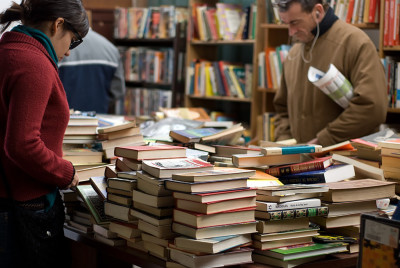
For most small businesses, Small Business Saturday doesn’t quite deliver the same punch as Black Friday — the crowds aren’t quite as big, the sales aren’t quite as extreme and the preparations aren’t nearly as abundant. But for some small business owners, the affair, which was held Saturday, is about much more than just the money they make.
Owners of Mint Julep and Black Ink, two small businesses with Boston and Cambridge locations, both said they appreciate the movement and its efforts to create more buzz for small businesses, even if revenue doesn’t compare to the more-established Black Friday just a day earlier.
“Generally, my experience is that it’s not our biggest day,” said Susan Corcoran, owner of Black Ink, a gift shop in Beacon Hill and Cambridge. “Is that a big make-or-break day for us?”
“No,” she later answered, matter-of-factly.
Small Business Saturday made its debut in 2010 as the Saturday following Thanksgiving. Introduced by American Express, the movement is intended to help “small business do more business,” its website says. Only shops that accept the credit card can officially participate.
Nestled between Black Friday and Cyber Monday, both of which tend to apply to large department or retail stores, the day is an attempt to bring increased revenue to the mom-and-pop shops of the world.
For Corcoran’s business, which opened in 1994 in its current Beacon Hill location, Small Business Saturday helps them show off their brand, even if not many people end up spending money.
“People do definitely come out to try to support,” she said, “but the bigger days are the [other] Saturdays leading up the holidays. That is a day for us to be totally prepared and open and ready for people to see what we have.”
Brooke Garber, co-owner of the boutique Mint Julep and a graduate of Boston University’s College of Communication, said her business rarely needs to do its own advertising for Small Business Saturday because American Express does much of it on its own.
“We always use their marketing stuff,” she said. “We pretty much just piggy-backed on what they’ve done, and I think it’s awesome that they’ve put a huge amount of their own marketing dollars into it.”
As for the money the store brings in, while it doesn’t compare to Black Friday, Garber said it can still boom.
“Black Friday was ridiculous. We couldn’t even keep up,” she said. “Saturday was a little slower, but still a very busy day.”
Garber added that the effort to help small businesses is beneficial for everyone. Without the flair of local stores, shopping could become redundant.
“The more people do make a point to shop locally, it’s good for everyone, good for the community and it keeps things interesting because if every store becomes a chain, it’s going to be really boring,” Garber said.
But for some owners, Small Business Saturday can still bring a much-needed revenue boost. For Sofi Madison, owner of Olives & Grace, an artisanal shop in Boston, business is generally better on Small Business Saturday than on Black Friday.
“Last year, Small Business Saturday was four times as successful as Black Friday,” she said.
In 2014, sales for small businesses during the 24-hour period seemingly skyrocketed, according to American Express. The company estimated that the small business launch brought in an estimated $14.3 billion for local stores, based on a survey.
But this year, many of the storeowners said, sales decreased — a side effect of the rainy weather, they assumed.
“This year was a little different because it was pouring rain, so I think it kept people out a little bit,” Garber said.
Still, Garber was surprised to see some were supporting their local stores.
“I’ve actually talked to a lot of customers that are going to buy all their gifts locally,” she said. “They’re only asking for things from local stores, which I think is really nice.”
Madison said the sales made on Small Business Saturday are essential to the store’s growth. While the purpose behind the day has an important sentiment, she said, her store also heavily relies on the tangible funds.
“For us, for Olives & Grace, we are truly, every day, talking about small businesses,” she said, noting that many of the products, if not her own, come from other small business. “Through and through, we support small businesses. We really rely on the boost of money that day.”
To keep small businesses successful, Corcoran said, the excitement needs to extend past one day.
“If you like to shop somewhere unique and experience something you only have here,” Corcoran said, “you have to support it year-round.”











































































































